Your search “Keep the death Penalty Abolished fin the philippines /page/www.humanrights.asia/resources/report/2011/AHRC-sur-008-2011/act_download/file ”
Document(s)
The Death Penalty V. Human Rights: Why Abolish the Death Penalty?
By Amnesty International, on 1 January 2007
2007
NGO report
fresMore details See the document
In this document Amnesty International calls on the UN General Assembly, 62nd session, (2007) to adopt a resolution affirming the right to life and stating that abolition of the death penalty is essential for the protection of human rights and to report on the implementation of the moratorium to the next session of the UNGA. It also calls on retentionist countries to establish a moratorium on executions and to respect international standards that guarantee the protection of the rights of those facing the death penalty.
- Document type NGO report
- Themes list Networks,
- Available languages UN CHÂTIMENT CONTRAIRE AUX DROITS HUMAINS : Pourquoi il faut abolir la peine de mortLOS DERECHOS HUMANOS FRENTE A LA PENA DE MUERTE : ¿Por qué abolir la pena capital? Septiembre de 2007
Document(s)
Note verbale dated 10 February 2009 from the Permanent Missions to the United Nations of Afghanistan, the Bahamas, […] and Zimbabwe addressed to the Secretary-General
By United Nations, on 8 September 2020
2020
United Nations report
Afghanistan
Bahamas
Bahrain
Bangladesh
Barbados
Botswana
Brunei Darussalam
Central African Republic
Chad
China
Comoros
Democratic People's Republic of Korea
Dominica
Egypt
Equatorial Guinea
Eritrea
Eswatini
Ethiopia
Fiji
Gambia
Grenada
Guinea
Guyana
Indonesia
Iran (Islamic Republic of)
Iraq
Jamaica
Japan
Jordan
Kuwait
Lao People's Democratic Republic
Libya
Malaysia
Maldives
Mauritania
Mongolia
Moratorium
Myanmar
Niger
Nigeria
Papua New Guinea
Qatar
Saint Kitts and Nevis
Saint Lucia
Saint Vincent and the Grenadines
Saudi Arabia
Singapore
Solomon Islands
Somalia
Sudan
Suriname
Syrian Arab Republic
Thailand
Tonga
Trinidad and Tobago
Uganda
United Arab Emirates
Yemen
Zimbabwe
aresfrruzh-hantMore details See the document
The Permanent Missions to the United Nations in New York listed below present their compliments to the Secretary-General of the United Nations and have the honour to refer to resolution 62/149, entitled “Moratorium on the use of the death penalty”, which was adopted by the Third Committee on 15 November 2007, and subsequently by the General Assembly on 18 December 2007 by a recorded vote. The Permanent Missions wish to place on record that they are in persistent objection to any attempt to impose a moratorium on the use of the death penalty or its abolition in contravention to existing stipulations under international law, for the following reasons:
- Document type United Nations report
- Countries list Afghanistan / Bahamas / Bahrain / Bangladesh / Barbados / Botswana / Brunei Darussalam / Central African Republic / Chad / China / Comoros / Democratic People's Republic of Korea / Dominica / Egypt / Equatorial Guinea / Eritrea / Eswatini / Ethiopia / Fiji / Gambia / Grenada / Guinea / Guyana / Indonesia / Iran (Islamic Republic of) / Iraq / Jamaica / Japan / Jordan / Kuwait / Lao People's Democratic Republic / Libya / Malaysia / Maldives / Mauritania / Mongolia / Myanmar / Niger / Nigeria / Papua New Guinea / Qatar / Saint Kitts and Nevis / Saint Lucia / Saint Vincent and the Grenadines / Saudi Arabia / Singapore / Solomon Islands / Somalia / Sudan / Suriname / Syrian Arab Republic / Thailand / Tonga / Trinidad and Tobago / Uganda / United Arab Emirates / Yemen / Zimbabwe
- Themes list Moratorium
- Available languages مذكرةشفويةمؤرخة١٠شـباط/فبرايـر٢٠٠٩Nota verbal de fecha 10 de febrero de 2009 dirigida al Secretario General por las misiones permanentes ante las Naciones Unidas del Afganistán, la Arabia Saudita, [...] y ZimbabweNote verbale datée du 10 février 2009, adressée au Secrétaire général par les Missions permanentes auprès de l’Organisation des Nations Unies de l’Afghanistan, de l’Arabie saoudite, [...] et du ZimbabweВербальная нота постоянных представительств Афганистана, БагамскихОстровов, […] и Чада при Организации Объединенных Наций от 10 февраля 2009 года на имя Генерального секретаря9年2月10日阿富汗、巴哈马、巴林、[...] 也门和津巴布韦常驻联合国代表团给秘书长的普通照会
Article(s)
Human Rights and the Death Penalty in Iran
on 19 June 2007
A gathering has taken place in Geneva on June 11, 2007 to protest against human rights violations in Iran. On the initiative of Human Rights in Iran, this demonstration was supported by Hands Off Caïn, the International Committee against Torture, Rights & Democracy, and the Canadian Center for the Victims of Torture (CCVT), among others.
2007
Cruel, Inhuman and Degrading Treatment and Punishment
Iran (Islamic Republic of)
Juveniles
Women

Member(s)
Mauritanian Coalition Against Death Penalty
on 30 April 2020
The main goals of the Mauritanian Coalition are the fight against death penalty, the defense of the universal human rights ideas, the struggle for equality between people, the promotion of peace in the world, and the cooperation between people. To achieve its goals, the Mauritanian Coalition’s main actions are conferences and workshops, and seminars for […]
2020
Mauritania

Member(s)
Prison Insider
on 30 April 2020
Prison Insider is a French independent NGO. Prison Insider’s main mission is to raise awareness about the conditions of detention and to promote the rights and dignity of people deprived of liberty, everywhere in the world. To reach its aims, the organisation primarily operates an information website. Prison Insider’s vocation is to make available and […]
France
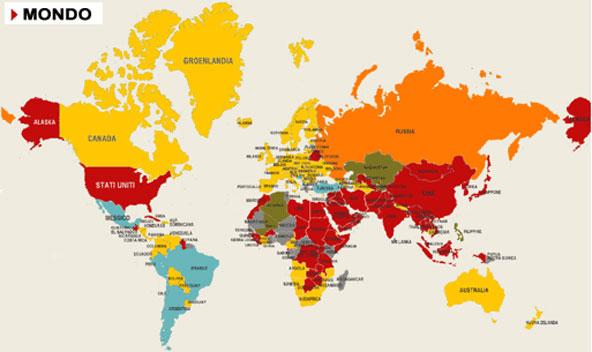
Article(s)
Hands Off Cain: number of executions and retentionist countries down in past year
on 29 July 2013
World Coalition member Hands Off Cain (HOC) presented its 2013 Report, ‘The Death Penalty Worldwide’ at its headquarters in Rome on 26 July. It recorded a sharp drop in executions.
2013
Document(s)
The death penalty and the “most serious crimes”: A country -by -country overview of the death penalty
By International Commission Against the Death Penalty, on 1 January 2013
2013
NGO report
More details See the document
This document provides brief commentary on the concept of “most serious crimes”, followed by a country by country overview of criminal offences punishable by death in retentionist states
- Document type NGO report
- Themes list Trend Towards Abolition, Statistics,
Article(s)
Human Rights Advocacy Officer
By Harm Reduction International, on 17 August 2017
Harm Reduction International is currently seeking to recruit Human Rights Advocacy Officer. Working as a member of the Campaigns and Advocacy Team.
2017
Document(s)
The question of the death penalty: Report of the Secretary-General
By United Nations, on 1 January 2006
2006
International law - United Nations
arrufrzh-hantesMore details See the document
The present report contains information covering the period from January 2004 to December 2005. The report indicates that the trend towards abolition of the death penalty continues; this is illustrated, inter alia, by the increase in the number of countries that are completely abolitionist and by the increase in ratifications of international instruments that provide for the abolition of this punishment.
- Document type International law - United Nations
- Themes list Trend Towards Abolition,
- Available languages مسألة عقوبة الإعدام; تقرير الأمين العامВопрос о смертной казни: Доклад Генерального секретаряQuestion de la peine de mort : Rapport du Secrétaire général死刑问题: 秘书长的报告La cuestión de la pena capital: Informe del Secretario General
Document(s)
REPORT AND RECOMMENDATIONS ON THE ADMINISTRATION OF THE DEATH PENALTY IN CALIFORNIA
By CALIFORNIA COMMISSION ON THE FAIR ADMINISTRATION OF JUSTICE, on 1 January 2008
2008
Government body report
More details See the document
This report is divided into three parts. In Part A, the Commission identifies flaws in California’s death penalty system that render it dysfunctional, and remedies we unanimously recommend to repair it. Repairing the system would enable California to achieve the national average of a twelve year delay between pronouncement of sentence and the completion of all judicial review of the sentence. In Part B, the Commission offers the Legislature, the Governor, and the voters of California information regarding alternatives available to California’s present death penalty law. The Commission makes no recommendation regarding these alternatives. In Part C, the Commission presents recommendations relating to miscellaneous aspects of the administration of California’s death penalty law. We were not able to reach unanimous agreement upon all of these recommendations, and dissents are noted where applicable. Commissioner Jerry Brown, Attorney General of California, agrees in principle with some of the Commission’s recommendations as set forth in his separate statement. Commissioner William Bratton, Chief of Police for the City of Los Angeles, abstains from the specific recommendations in this Report, and will issue a separate explanatory statement.
- Document type Government body report
- Themes list Networks,
Document(s)
Evaluating fairness and accuracy in state death penalty systems: The Missouri Death Penalty Assessment Report
By American Bar Association, on 1 January 2012
2012
NGO report
More details See the document
This study reflect on the aspects of fairness and accuracy as foundation of the American criminal justice system. As the Supreme Court of the United States has recognized, these goals are particularly important in cases in which the death penalty is sought. A system cannot claim to provide due process or protect the innocent unless it offers a fair and accurate system for every person who faces the death penalty.
- Document type NGO report
- Themes list Due Process , Country/Regional profiles,
Document(s)
2016 Report – Moratorium on the use of the death penalty
By United Nations, on 8 September 2020
2020
United Nations report
rufrzh-hantesMore details See the document
The present report is submitted to the General Assembly pursuant to its resolution 69/186. It discusses developments towards the abolition of the death penalty and the establishment of moratoriums on executions. The report also reflects on trends in the use of the death penalty, including the application of international standards relating to the protection of the rights of those facing the death penalty. It also discusses the role of national human rights institutions and private companies, as well as regional and international initiatives for advancing the abolition of the death penalty.
- Document type United Nations report
- Themes list International law, Moratorium , Trend Towards Abolition,
- Available languages Доклад 2016 - Мораторий на применение смертной казниRapport 2016 - Moratoire sur l’application de la peine de mort2016报告 - 暂停使用死刑Informe 2016 - Moratoria del uso de la pena de muerte
Document(s)
FHRI and PRI submission to the UN Sec-Gen report on the status of the death penalty in East Africa – Kenya and Uganda April 2012
By Penal Reform International, on 8 September 2020
NGO report
Kenya
More details See the document
Two trends accompanying the abolition of the death penalty give reason for concern: there is a striking increase in offences that carry the sanction of life imprisonment as the sanction which typically replaces the death penalty following abolition or a moratorium of the death penalty; and a striking increase in prisoners serving this indefinite sentence. Secondly, a differential, harsher treatment is applied to them as compared to other categories of prisoners. At the same time, the development of international standards in any affirmative–if not legally binding– form are lacking. As a consequence states are more frequently enforcing a form of punishment problematic in terms of international human rights standards and norms.
- Document type NGO report
- Countries list Kenya
- Themes list Trend Towards Abolition,
Document(s)
Second Optional Protocol to the International Covenant on Civil and Political Rights, aiming at the abolition of the death penalty
By United Nations, on 1 January 1989
1989
United Nations report
arrufrzh-hantesMore details See the document
The States Parties to the present Protocol,Believing that abolition of the death penalty contributes to enhancement of human dignity and progressive development of human rights,Recalling article 3 of the Universal Declaration of Human Rights, adopted on 10 December 1948, and article 6 of the International Covenant on Civil and Political Rights, adopted on 16 December 1966,Noting that article 6 of the International Covenant on Civil and Political Rights refers to abolition of the death penalty in terms that strongly suggest that abolition is desirable,Convinced that all measures of abolition of the death penalty should be considered as progress in the enjoyment of the right to life,Desirous to undertake hereby an international commitment to abolish the death penalty,Have agreed as follows:Article 11. No one within the jurisdiction of a State Party to the present Protocol shall be executed.2. Each State Party shall take all necessary measures to abolish the death penalty within its jurisdiction.
- Document type United Nations report
- Themes list International law,
- Available languages البروتوكول الاختياري الثاني الملحق بالعهد الدولي الخاص بالحقوق المدنية والسياسية بهدف العمل علي إلغاء عقوبة الإعدامВторой Факультативный протокол к Международному пакту о гражданских и политических правах, направленный на отмену смертной казниDeuxième protocole facultatif se rapportant au Pacte international relatif aux droits civils et politiques, visant à l'abolition de la peine de mort第二任择议定书的公民权利和政治权利国际公约,其目的在废除死刑Segundo Protocolo Facultativo del Pacto Internacional de Derechos Civiles y Políticos, destinado a abolir la pena de muerte
Document(s)
Fourteen Days in May
By Paul Hamann, on 30 November 2018
2018
Arguments against the death penalty
Multimedia content
Death Row Conditions
More details See the document
Fourteen Days in May is a documentary directed by Paul Hamann. The program recounts the final days before the execution of Edward Earl Johnson, an American prisoner convicted of rape and murder.
The documentary crew, given access to the prison warden, guards and chaplain and to Johnson and his family, filmed the last days of Johnson’s life in detail. The documentary argues against the death penalty and maintains that capital punishment is disproportionately applied to African-Americans convicted of crimes against whites. The programme features attorney Clive Stafford Smith, an advocate against capital punishment.
- Document type Arguments against the death penalty / Multimedia content
- Themes list Death Row Conditions
Member(s)
Comisión Cubana de Derechos Humanos y Reconciliación Nacional
on 30 April 2020
Mandate and Objectives: Promotion and protection of all HR for all. Programme for the abolition of the death penalty. Training programs. Free legal aid services. Preparation of monthly and special reports. Request for precautionary measures to international organizations. Type of actions: Legal defense. Education and outreach in the field of Hman Rights and Humanitarian aid […]
2020
Cuba
Article(s)
Asia-Pacific youths oppose the death penalty in pictures
on 10 October 2008
Amnesty International’s Asia Pacific Youth Network has been collecting photos of young people protesting against capital punishment in the lead up to World Day Against the Death Penalty.
2008
Article(s)
Fair and open investigation in Uyghur region
on 21 July 2009
Following the death penalty threats issued against protestors in Xinjiang, the World Coalition calls on China to respect its international committments and to guarantee fair trials.
2009
China
Fair Trial
Document(s)
Death Penalty in Pakistan
By Justice Project Pakistan, on 10 October 2022
2022
NGO report
Pakistan
More details See the document
The implementation of capital punishment has seen substantial shifts over the course of the past decade. During the period from the end of a moratorium on executions in December 2014 to August 2019, an estimated 1,800 death sentences were imposed across the entire court system and 520 people were executed. Various amendments to Pakistan’s criminal law over the past several decades have resulted in a list of 33 offenses, most of which are far removed from the definition of the “most serious crimes” under international law. A full list of offences is attached at the end of the report.
- Document type NGO report
- Countries list Pakistan
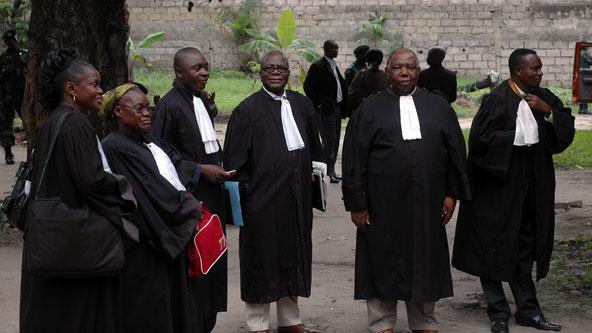
Article(s)
New defense manual to help lawyers in capital cases worldwide
By Thomas Hubert, on 29 May 2013
The World Coalition, together with Death Penalty Worldwide and the law firm of Fredrikson & Byron P.A., has launched the English and French editions of a manual compiling guidelines for defense lawyers whose clients face the death penalty at the 5th World Congress Against the Death Penalty.
2013
Legal Representation
Document(s)
The Death Penalty in 2014 : Year End Report
By Death Penalty Information Center, on 1 January 2014
2014
NGO report
More details See the document
On December 18, DPIC released its annual report on the latest developments in capital punishment, “The Death Penalty in 2014: Year End Report.” In 2014, 35 people were executed, the fewest in 20 years. Death sentences dropped to their lowest level in the modern era of the death penalty, with 72 people sentenced to death, the smallest number in 40 years. Just seven states carried out executions, and three states (Texas, Missouri, and Florida) accounted for 80% of the executions. The number of states carrying out executions was the lowest in 25 years. Seven people were exonerated from death row this year, including three men in Ohio, who were cleared of all charges 39 years after their convictions, the longest time among all death row exonerees. There have now been 150 people exonerated from death row since 1973. “The relevancy of the death penalty in our criminal justice system is seriously in question when 43 out of our 50 states do not apply the ultimate sanction,” said Richard Dieter, DPIC’s Executive Director and the author of the report. “The U.S. will likely continue with some executions in the years ahead, but the rationale for such sporadic use is far from clear.”
- Document type NGO report
- Themes list Networks, Statistics,
Document(s)
The Death Penalty in the OSCE Area: Background Paper 2017
By Organization for Security and Co-operation in Europe (OSCE), on 1 January 2017
2017
International law - Regional body
More details See the document
OSCE participating States have made a number of commitments regarding the death penalty, including considering the potential abolition of capital punishment, to exchange information toward that end and to make information on the use of the death penalty available to the public.1 Where the death penalty is still in use, participating States have agreed that it could be imposed only for the most serious crimes and only in line with international commitments.2 In light of these commitments and its mandate, the OSCE Office for Democratic Institutions and Human Rights (ODIHR) monitors trends and new developments regarding human rights standards and practices among OSCE participating States related to the death penalty. The findings are presented each year in the Background Paper on the Status of the Death Penalty in the OSCE Area. The background paper is based on the information provided by participating States, in the form of responses to ODIHR questionnaires. The information from their responses has been included in the present report, to the extent possible, and is supplemented with information from international and regional human rights bodies, non-governmental organizations and media reports.
- Document type International law - Regional body
- Themes list International law, Death Penalty, Country/Regional profiles,
Article(s)
Mobilisation for Mumia Abu Jamal
on 19 June 2007
Last May 17, the Philadelphia Federal Court of Appeal held a hearing that could seal the fate of Mumia Abu Jamal. On the occasion of this new hearing, the Collectif unitaire de soutien à Mumia Abu Jamal, and all his supporters, organized public mobilization and information initiatives on all continents.
2007
Fair Trial
United States
Article(s)
Video: meet Taiwan’s anti-death penalty activists
on 16 June 2009
The Taiwan Alliance to End the Death Penalty has just released a clip presenting its work and the status of capital punishment in the country.
2009
Taiwan
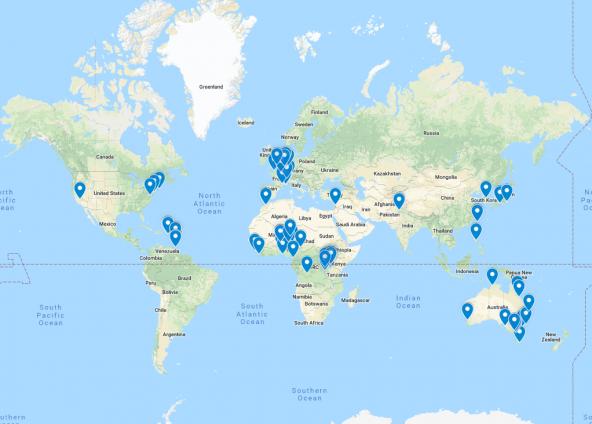
Article(s)
Take Action for World Day 2018!
By World Coalition Against the Death Penalty, on 10 September 2018
Check what you can do for 10 October. Browse the calendar of events and the map to prepare and promote the events planned around the world on the big day.
2018
Death Row Conditions
Document(s)
Key legal Instruments and texts adopted on Abolition of the death penalty by the Council of Europe
By Council of Europe, on 24 January 2023
2023
Regional body report
Trend Towards Abolition
frMore details See the document
All the Council of Europe documents related to abolition of the death penalty gathered in one page : decisions of the Committee of Ministers, resolutions of the Parliamentary Assembly, Treaties…
- Document type Regional body report
- Themes list Trend Towards Abolition
- Available languages Instruments juridiques clés et textes adoptés sur l'abolition de la peine de mort par le Conseil de l'Europe
Document(s)
Question of the death penalty: Report of the Secretary-General 2014
By United Nations, on 8 September 2020
2020
NGO report
fresarruzh-hantMore details See the document
Pursuant to Human Rights Council decision 18/117, the present report is submittedin order to update previous reports on the question of the death penalty. The reportconfirms that the trend towards the universal abolition of the death penalty is continuing.However, numerous concerns remain with regard to the lack of respect for internationalhuman rights norms and standards in States that still impose the death penalty. Asrequested in Human Rights Council resolution 22/11, the report also includes informationon the human rights of children of parents sentenced to the death penalty or executed
- Document type NGO report
- Themes list Trend Towards Abolition,
- Available languages Question de la peine de mort: Rapport du Secrétaire général 2014La cuestión de la pena capital: Informe del Secretario General 2014مسألةعقوبةالإعدامتقريرالأمينالعام2014Вопрос о смертной казни: Доклад Генерального секретаря 2014死刑问题 秘书长的报告 2014
Document(s)
Death penalty in Iran: A State terror policy – Special Update for 11th World Day against the Death Penalty
By International Federation for Human Rights (FIDH), on 8 September 2020
NGO report
Iran (Islamic Republic of)
faMore details See the document
The change of administration in the Islamic Republic of Iran (IRI) and taking of office by a new president on 3 August 2013 has not brought any change as far as the death penalty is concerned. Between the 14 June presidential election and 1st October, more than 200 people have been reportedly executed, including possibly three people who may have been younger than 18 at the time of the commission of the alleged crimes.Against this backdrop, FIDH and its member organisation, LDDHI, have decided topublish the present report to analyse the new penal laws in force in Iran that are invoked consistently to violate the right to life in general and to execute child offenders. Coinciding with 10 October 2013, World Day against the Death Penalty, this report aimsto serve as an update on the current state of application of the death penalty in the IRI.
- Document type NGO report
- Countries list Iran (Islamic Republic of)
- Themes list Juveniles, Drug Offences, Hanging, Country/Regional profiles,
- Available languages مجازﺯاﺍتﺕ اﺍعداﺍمﻡ دﺩرﺭ اﺍﯾﻳراﺍنﻥ - سﯿﻴاست دﺩوﻭلتﯽﻲ اﺍﯾﻳجادﺩ وﻭحشت - وﻭﯾﻳژهﻩ ﯾﻳازﺯدﺩهمﯿﻴن رﺭوﻭزﺯ جهانﯽﻲ ضد مجازﺯاﺍتﺕ اﺍعداﺍمﻡ
Document(s)
Life After Sentence of Death: What Becomes of Individuals Under Sentence of Death After Capital Punishment Legislation is Repealed or Invalidated
By James R. Acker, Brian W. Stull, on 25 July 2021
2021
Academic report
United States
More details See the document
More than 2500 individuals are now under sentence of death in the United States. At the same time, multiple indicators—public opinion polls, legislative repeal and judicial invalidation of deathpenalty laws, the reduction in new death sentences, and infrequency of executions—suggest that support for capital punishment has significantly eroded. As jurisdictions abandon or consider eliminating the death-penalty, the fate of prisoners on death row—whether their death sentences, valid when imposed, should be carried out or whether these individuals should instead be spared execution—looms as contentious political and legal issues, fraught with complex philosophical, penological, and constitutional questions. This article presents a detailed account of what has happened historically to persons awaiting execution, principally within the United States but also internationally, at the time capital-punishment legislation is repealed or invalidated (either completely, or with respect to a narrow category of crimes or persons). Our analysis has uncovered no instances of executions being carried out under those circumstances. This finding has important policy implications and is directly relevant to the Supreme Court’s Eighth Amendment jurisprudence, which relies on execution practices as one measure to help inform the Court about whether the death penalty is a cruel and unusual punishment.
- Document type Academic report
- Countries list United States
Document(s)
The Fear of Too Much Justice : Race, Poverty, and the Persistence of Inequality in the Criminal Courts
By Stephen B. Bright, James Kwak , on 21 April 2023
2023
Book
Fair Trial
United States
More details See the document
In The Fear of Too Much Justice, legendary death penalty lawyer Stephen B. Bright and legal scholar James Kwak offer a heart-wrenching overview of how the criminal legal system fails to live up to the values of equality and justice. The book ranges from poor people squeezed for cash by private probation companies because of trivial violations to people executed in violation of the Constitution despite overwhelming evidence of intellectual disability or mental illness. They also show examples from around the country of places that are making progress toward justice.
With a foreword by Bryan Stevenson, who worked for Bright at the Southern Center for Human Rights and credits him for “[breaking] down the issues with the death penalty simply but persuasively,” The Fear of Too Much Justice offers a timely, trenchant, firsthand critique of our criminal courts and points the way toward a more just future.
Available: June 2023
- Document type Book
- Countries list United States
- Themes list Fair Trial
Article(s)
8 Demands for Beijing
on 21 June 2007
By welcoming the Olympics in 2008, China committed itself to improving its human rights situation. Anxious to remind Chinese authorities of their commitments, nine French associations, five of which are members of the World Coalition, created the China 2008 Olympic Games Collective.
2007
China
Document(s)
Question of the death penalty: Report of the Secretary-General 2016
By United Nations, on 1 January 2016
2016
International law - United Nations
rufrzh-hantesMore details See the document
Pursuant to Human Rights Council decision 18/117, the present report is submitted to update previous reports on the question of the death penalty. The report confirms that the trend towards the universal abolition of the death penalty is continuing. However, a minority of States continued to use the death penalty in contravention of international human rights law. As requested in Human Rights Council resolution 22/11, the present report also includes information on the human rights of children of parents sentenced to the death penalty or executed.
- Document type International law - United Nations
- Themes list Trend Towards Abolition,
- Available languages Вопрос о смертной казни Доклад Генерального секретаря 2016Question de la peine de mort: Rapport du Secrétaire général 2016死刑问题 秘书长的报告 2016La cuestión de la pena capital: Informe del Secretario General 2016
Document(s)
The European Union and the Abolition of the Death Penalty
By Christan Behrmann and Jon Yorke / Pace University, School of Law, on 1 January 2013
2013
Academic report
More details See the document
This article investigates how the EU has evolved its abolitionist position. It analyzes the development of the region’s internal policy beginning in the European Parliament, to the rejection of the punishment being mandated as a Treaty provision, which evolves into anintegral component of the external human rights project. The EU has now formulated technical bilateral and multilateral initiatives to promote abolition worldwide. This is most clearly evidenced in the EU playing an important role in the 2007 United Nations General Assembly Resolution on the moratorium on the use of the death penalty, and the strengthening of the resolution in 2008, 2010, and 2012. This article demonstrates that the EU’s contribution to the abolition of the deathpenalty is a recognizable success story of human rights, and it is one aspect of the regions’ policies that was rewarded in 2012 with the Nobel Peace Prize.
- Document type Academic report
- Themes list Trend Towards Abolition,
Document(s)
Justice Project Pakistan, Pakistanis Imprisoned Abroad Database
By Justice Project Pakistan (JPP), on 7 February 2024
2024
NGO report
Pakistan
More details See the document
Pakistan is counted among the countries that rely heavily on foreign remittances for economic stability and foreign reserves. However, despite its dependence on foreign remittances from migrant workers, Pakistan has done little to protect its vulnerable citizens from landing in foreign jails. As a result, Pakistan has seen a significant increase in the number of prisoners and executions abroad. Inadequate oversight and the lack of proper enforcement of existing protections is a literal death sentence for scores of Pakistanis who simply seek a better life and improved prospects for loved ones by working abroad.
- Document type NGO report
- Countries list Pakistan
Document(s)
Sri Lankan expert needed to conduct study on the death penalty – Terms of reference
By World Coalition Against the Death Penalty, on 23 December 2021
2021
World Coalition
More details Download [ pdf - 83 Ko ]
- Document type World Coalition

Member(s)
Association Marocaine des Droits Humains (AMDH)
on 30 April 2020
Association marocaine des droits humains (AMDH) works towards safeguarding human dignity and for the respect, defence and promotion of human rights. Convinced of the universal nature of these rights, the AMDH bases its action on the international agreements which defend them. It campaigns for them to be respected in the political, civil, economic, social and […]
2020
Morocco
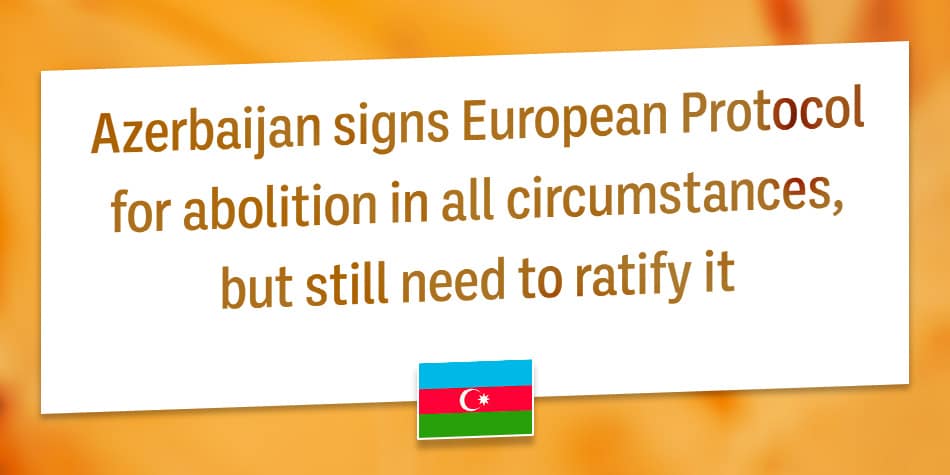
Article(s)
Azerbaijan signs European Protocol for abolition in all circumstances, but still need to ratify it
By Aurélie Plaçais, on 28 March 2023
On 8 March 2023, Azerbaijan signed Protocol No. 13 to the Convention for the Protection of Human Rights and Fundamental Freedoms.
2023
Azerbaijan
Trend Towards Abolition

Article(s)
Loopholes in Saudi promise to end death sentences against children
on 6 May 2020
Saudi Arabia’s Human Rights Commission has announced that children are no longer eligible for the death penalty in the Kingdom. Citing a royal decree, the commission stated that anyone convicted of crimes that took place while they were under the age of 18 will face a maximum punishment of ten years in juvenile detention.
2020
Juveniles
Saudi Arabia

Member(s)
Citizens United for Rehabilitation of Errants (CURE)
on 30 April 2020
Citizens United for Rehabilitation of Errants (CURE) is a grassroots organization that was founded in Texas in 1972. It became a national organization in 1985. CURE believes that prisons should be used only for those who absolutely must be incarcerated and that those who are incarcerated should have all of the resources they need to […]
2020
United States
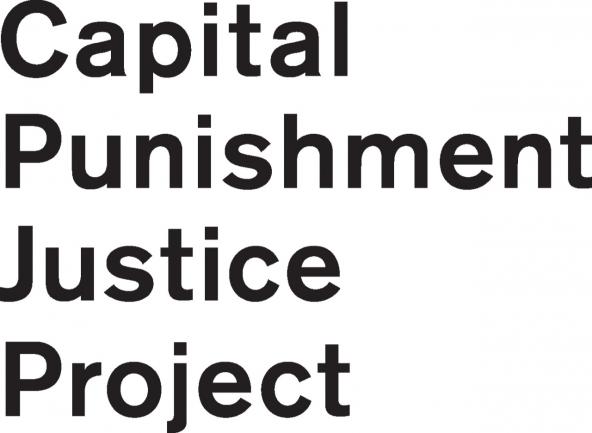
Member(s)
Capital Punishment Justice Project (CPJP)
on 30 April 2020
Capital Punishment Justice Project – CPJP (formerly known as Reprieve Australia) is an Australian NGO working to assist in the provision of effective legal representation and humanitarian assistance to those facing the death penalty at the hands of the State. CPJP also works to raise awareness of the application of the death penalty by the […]
Australia
Document(s)
Innocence and the Crisis in the American Death Penalty
By Death Penalty Information Center / Richard C. Dieter, on 1 January 2004
2004
NGO report
More details See the document
This report catalogs the emergence of innocence as the most important issue in the long-simmering death penalty debate. The sheer number of cases and the pervasive awareness of this trend in the public’s consciousness have changed the way capital punishment is perceived around the country. The steady evolution of this issue since the death penalty was reinstated in 1976 has been accelerated in recent years by the development of DNA technology, the new gold standard of forensic investigation. This science, along with a vigorous re-investigation of many cases, has led to the discovery of a growing number of tragic mistakes and freed inmates. The evidence in this report presents a compelling case for many Americans that the risks associated with capital punishment exceed acceptable bounds. One hundred and sixteen people have been freed from death row after being cleared of their charges, including 16 people in the past 20 months. These inmates cumulatively spent over 1,000 years awaiting their freedom. The pace of exonerations has sharply increased, raising doubts about the reliability of the whole system.
- Document type NGO report
- Themes list Innocence,
Document(s)
The Death Penalty: Should the Judge or the Jury Decide Who Dies?
By John H. Blume / Theodore Eisenberg / Sheri Lynn Johnson / Cornell Law Review / Martin T. Wells / Valerie P. Hans / Amelia Courtney Hritz / Caisa E. Royer, on 1 January 2014
2014
Academic report
More details See the document
This article addresses the effect of judge versus jury decision making through analysis of a database of all capital sentencing phase hearing trials in the state of Delaware from 1977-2007. Over the three decades of the study, Delaware shifted responsibility for death penalty sentencing from the jury to the judge. Currently, Delaware is one of the handful of states that gives the judge the final decision making authority in capital trials. Controlling for a number of legally-relevant and other predictor variables, we find that the shift to judge sentencing significantly increased the number of death sentences. Statutory aggravating factors, stranger homicides, and the victim’s gender also increased the likelihood of a death sentence, as did the county of the homicide. We reflect on the implications of these results for debates about the constitutionality of judge sentencing in capital cases.
- Document type Academic report
- Themes list Statistics, Country/Regional profiles,
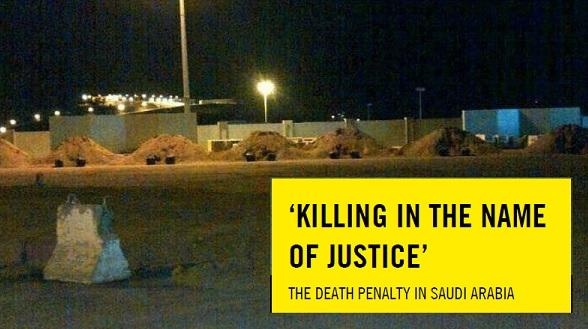
Article(s)
Saudi Arabia: “Killing in the Name of Justice”
By Elisa Belotti, on 7 October 2015
When it comes to the execution of death penalties, Saudi Arabia is one of the most prolific country in the world. This is what emerges from a new report published by Amnesty International in August 2015.
2015
Saudi Arabia
Document(s)
Justice by Geography and Race: The Administration of the Death Penalty in Maryland 1978-1999
By Robert Brame / Raymond Paternoster / Margins Law Journal / Sarah Bacon / Andrew Ditchfield, on 1 January 2004
2004
Article
United States
More details See the document
Since July 1978, when Maryland’s capital punishment statute took effect, the State has been plagued by charges that the imposition of the death penalty is influenced by the race of the defendant and the legal jurisdiction in which the homicide occurred. Most critics use the characteristics of condemned inmates on Maryland’s death row, which reveal possible racial motivations. However, the authors argue that simply relying on the characteristics of condemned inmates reveals little about the underlying mechanisms of the imposition of the death penalty. The recent history of capital punishment in Maryland is reviewed, followed by a brief description of the legal structure of capital punishment under Maryland law. In order to empirically measure whether the imposition of capital punishment in Maryland is discriminatory, the authors examined 1,311 death eligible cases in Maryland from July 1, 1978 to December 31, 1999. Death eligible cases were defined as those cases in which the State’s attorney filed a notice of intention to seek a death sentence, the facts established that first degree murder was committed, the defendant was the principle in the first degree murder, the murder included at least one statutory aggravating circumstance, and the defendant was eligible for capital punishment at the time of the offense. The statistical strategy focused on determining the influence of race of victim, race of defendant, and geography on the imposition of the death penalty. Findings suggest that race and geography indeed play an important role in the Maryland justice system. Race and geography exert their most influence at the death notification and death notice retraction stages of the process. Thus, it is prosecutorial discretion that is the most apparent in the possible discriminatory application of capital punishment in Maryland. The findings from this study are unsurprising and are in line with similar studies from other States. The author cautions that overt racism is not necessarily the reason beyond the disproportionate application of capital punishment.
- Document type Article
- Countries list United States
- Themes list Networks,
Document(s)
The Death Penalty in the US in 2015 : Year End Report
By Death Penalty Information Center, on 1 January 2015
2015
NGO report
More details See the document
The use of the death penalty in the U.S. declined by virtually every measure in 2015. The 28 executions this year marked the lowest number since 1991. As of December 15, fourteen states and the federal government have imposed 49 new death sentences this year, a 33% decline over last year’s total and the lowest number since the early 1970s when the death penalty was halted by the U.S. Supreme Court. Only six states conducted executions this year, the fewest number of states in 27 years. Eighty-six percent of executions this year were concentrated in just three states: Texas (13), Missouri (6), and Georgia (5). Executions in 2015 declined 20 percent from 2014, when there were 35. This year was the first time in 24 years that the number of executions was below 30.
- Document type NGO report
- Themes list Trend Towards Abolition, Statistics, Country/Regional profiles,
Document(s)
The Death Penalty in Japan: The Law of Silence – Going Against the International Trend
By Florence Bellivier / International Federation for Human Rights (FIDH) / Dan Van Raemdonck / Jiazhen Wu, on 8 September 2020
2020
NGO report
Japan
frMore details See the document
This report is the outcome of a fact-finding mission conducted by FIDH in July 2008, in order to assess the measures taken by the Japanese government to implement the recommendations made by a previous investigation, conducted in 2003.The conclusions of the report are appalling. According to Florence Bellivier, General Secretary of FIDH “Japan continues to condemn criminals to death, and incarcerate them up for decades, in prisons where secrecy and isolation are commonplace, in total disregard of the world opinion”. In addition, the rhythm of the executions has accelerated over the recent years. “2008 has been a record year, with more executions this year than in any other of the last fifteen years. We are witnessing a real step backwards” added Dan Van Raemdonck, Vice-President of FIDH. Thirteen persons have been executed since the beginning of the year, and 102 are currently on death row. There has not been a single retrial of a death penalty case since 1986, and no convicted prisoner has been pardoned since 1975.
- Document type NGO report
- Countries list Japan
- Themes list Transparency, Country/Regional profiles,
- Available languages La peine de mort au Japon: la loi du silence - À contre-courant de la tendance internationale
Article(s)
Human Rights Advocacy Officer – Harm Reduction International
By Harm Reduction International, on 23 January 2018
Harm Reduction International is currently seeking to recruit a Human Rights Advocacy Officer, working as a member of their Campaigns and Advocacy Team.
2018
United Kingdom
Document(s)
The Death Penalty in Japan: A report on Japan’s legal obligations under the International Convenant on Civil and Political Rights and an assessment of public attitudes to capital punishment
By Saul Lehrfreund / Death Penalty Project, on 8 September 2020
2020
NGO report
Japan
More details See the document
This report was commissioned by the Death Penalty Project in order to assess Japan’s legal obligations on the use of the death penalty under the ICCPR, and to examine the related subject of public attitudes toward capital punishment in Japan.
- Document type NGO report
- Countries list Japan
- Themes list International law, Public opinion,
Document(s)
REPORT OF THE TASK FORCE ON REVIEW OF THE MANDATORY DEATH SENTENCE UNDER SECTION 204 OF THE PENAL CODE
By THE TASK FORCE ON REVIEW OF THE MANDATORY DEATH SENTENCE , on 1 January 2019
2019
International law - Regional body
More details See the document
The report incorporates the results of the audit and recommendations for the design of a comprehensive framework for resentence hearings of capital offenders in Kenya. The framework could guide courts to conduct the resentence hearing process in a structured and evidence-based manner, taking into consideration all the key information that is necessary for mitigation, reintegration and resettlement needs of the offenders, allow the input of the victims, families and communities to be considered, and ensure consistency in resentencing judgments across the country.
- Document type International law - Regional body
- Themes list Death Penalty,
Document(s)
The Report of the Oklahoma Death Penalty Review Commission
By The Constitution Project, on 1 January 2016
2016
NGO report
More details See the document
The Oklahoma Death Penalty Review Commission (Commission) came together shortly after the state of Oklahoma imposed a moratorium on the execution of condemned inmates. In late 2015, Oklahoma executions were put on hold while a grand jury investigated disturbing problems involving recent executions, including departures from the execution protocols of the Department of Corrections. The report of the grand jury, released in May of 2016, was highly critical and exposed a number of deeply troubling failures in the final stages of Oklahoma’s death penalty
- Document type NGO report
- Themes list World Coalition Against the Death Penalty, Death Penalty,
Document(s)
A Penalty Without Legitimacy: The Mandatory Death Penalty in Trinidad and Tobago
By Douglas Mendes / Florence Seemungal / Jeffrey Fagan / Roger Hood / The Death Penalty Project, on 1 January 2009
2009
NGO report
More details See the document
As a result of legal challenges, and in line with the trend worldwide, the mandatory death penalty has now been abolished in nine Caribbean countries and a discretion to impose a lesser sentence has been given to the judges of the Eastern Caribbean, Belize, Jamaica and the Bahamas. However, in relation to Trinidad & Tobago, in the case of Charles Matthew (Matthew v The State [2005] 1 AC 433), a majority of the Judicial Committee of the Privy Council decided – notwithstanding that the mandatory death penalty was cruel and unusual punishment in violation of entrenched fundamental freedoms and human rights established in the Constitution of Trinidad & Tobago – that it remained protected from constitutional challenge by the operation of the “savings clause” in the Constitution. As a result, Trinidad & Tobago remains one of only three Commonwealth Caribbean countries (Barbados and Guyana being the other two) that still retains the mandatory death penalty.
- Document type NGO report
- Themes list Mandatory Death Penalty,
Document(s)
Death without Justice: A Guide for Examining the Administration of the Death Penalty in the United States
By American Bar Association, on 1 January 2001
2001
Working with...
More details See the document
This guide was created because of the growing flaws in the adminstration of the death penatly, it provides a guide to the death penalty administration process and vulnerable populations in death row administration.
- Document type Working with...
- Themes list Networks,
Document(s)
The Death Penalty in Ohio: Fairness, Reliability, and Justice at Risk—A Report on Reforms in Ohio’s Use of the Death Penalty Since the 1997 Ohio State Bar Association Recommendations
By S. Adele Shank / Ohio State Law Journal, on 1 January 2002
2002
Article
United States
More details See the document
The report as presented to the Ohio State Bar Association Council of Delegates in 1997,the OSBA’s recommendations and, where there have been changes in the law since that time, updates reflecting those changes. New information is noted at the conclusion of each section of the report immediately following the OSBA recommendation for that section.
- Document type Article
- Countries list United States
- Themes list Networks,

Article(s)
Expanded Ban on Death Penalty for Intellectually Disabled People in California
By Louis Linel, on 1 September 2020
The California State Legislature extended the ban on capital punishment for intellectually disabled people
2020
Intellectual Disability
United States

Member(s)
Amnesty International (AI)
on 30 April 2020
Amnesty International (AI) is a worldwide voluntary activist movement working for human rights. It is independent of any government, political ideology, or religious creed, economic interest or religion. It does not support or oppose any government or political system, nor does it support or oppose the views of the victims whose rights it seeks to […]
2020
United Kingdom
Article(s)
Religion in favour of abolition
on 28 February 2010
Skull-cap, scarf and priest’s white collar gathered at a round table to discuss the issue of religion in terms of the death penalty.
2010
Thailand
Article(s)
Portraits of the death penalty
on 26 February 2010
Since 2006, US-based French photographer Caroline Planque has been working on a series of portraits of indirect victims of the death penalty in the US State with the highest number of executions – Texas.
2010
United States
Document(s)
Dealing with Punishment: Risks and Rewards in Indonesia’s Illicit Drug Trade
By Carolyn Hoyle, Death Penalty Project, on 18 April 2023
2023
NGO report
Drug Offenses
Indonesia
More details See the document
In 2020-2021, The Death Penalty Project, in partnership with Community Legal Aid Institute, LBH Masyarakat, commissioned The Death Penalty Research Unit (DPRU) at the University of Oxford, in association with University Centre of Excellence HIV/AIDS Research Centre-HPSI at Atma Jaya Catholic University of Indonesia (AJCU), to conduct the research building empirical knowledge on who is being convicted for drug offences and uncover the factors that have influenced their motivations and decision making. Interviews were conducted on 57 prisoners from a prison in Jakrata, Indonesia, all convicted for drug offences. This is the first stage of a larger mapping project, which will interview those convicted of drug offences and sentenced to death or life in prisons across Indonesia and Southeast Asia. It also compliments our two part opinion study on attitudes on capital punishment in Indonesia.
- Document type NGO report
- Countries list Indonesia
- Themes list Drug Offenses
Document(s)
Question of the death penalty : report of the Secretary-General submitted pursuant to Commission on Human Rights resolution 2002/77
By United Nations, on 1 January 2003
2003
International law - United Nations
arrufrzh-hantesMore details See the document
The present report contains information covering the period from January 2001 through December 2002, in order to ensure that there are no gaps in coverage since the last version of the sixth quinquennial report which covered information up to the end of 2000. The report indicates that the trend towards abolition of the death penalty continues, which is illustrated, inter alia, by the increase in the number of ratifications of international instruments that provide for the abolition of this punishment.
- Document type International law - United Nations
- Themes list Trend Towards Abolition,
- Available languages الموضوع العقوبة الاعدام : تقرير الأمين العام مقدم بشأن قرار اللجنة للحقوق الانسان 2002/77Вопрос о смертной казни: Доклад Генерального секретаря, представляемый в соответствии с резолюцией 2002/77 КомиссииQuestion de la peine de mort: Rapport du Secrétaire général présenté en application de la résolution 2002/77死刑问题: 秘书长按照委员会第2002/77 号决议提交的报告Cuestión de la pena capital: Informe del Secretario General presentado de conformidad con la resolución 2002/77 de la Comisión
Document(s)
The Death Penalty in 2013: Year End Report
By Death Penalty Information Center / Richard C. Dieter, on 1 January 2013
2013
NGO report
More details See the document
On December 19, the Death Penalty Information Center released its annual report on the latest developments in capital punishment, “The Death Penalty in 2013: Year End Report.” In 2013, executions declined, fewer states imposed death sentences, and the size of death row decreased compared to the previous year. The number of states with the death penalty also dropped, and public support for capital punishment registered a 40-year low. There were 39 executions in the U.S., marking only the second time in 19 years that there were less than 40. Just two states, Texas (16) and Florida (7), were responsible for 59% of the executions. The number of death sentences (80) remained near record lows, and several major death penalty states, inclucing Virginia, South Carolina, Tennessee, and Louisiana, imposed no death sentences this year. Maryland became the sixth state in six years to abolish capital punishment.
- Document type NGO report
- Themes list Trend Towards Abolition, Statistics,
Document(s)
The Death Penalty in Taiwan: a Report on Taiwan’s legal obligations under the ICCPR
By David T. Johnson / The Death Penalty Project / Wen-Chen Chang, on 8 September 2020
2020
NGO report
Taiwan
More details See the document
The report highlights specific aspects of Taiwan’s domestic legal order that does not meet the minimum standards under the International Covenant on Civil and Political Rights (ICCPR). Taiwan passed legislation to incorporate the ICCPR into the domestic legal order in 2009, yet the current death penalty practice is largely out of line with the contemporary understanding of the ICCPR as it relates to the death penalty.
- Document type NGO report
- Countries list Taiwan
- Themes list International law, Country/Regional profiles,
Document(s)
Annual Report on the Death Penalty: The Case of Puerto Rico – 2015
By Puerto Rican Coalition against the Death Penalty, on 8 September 2020
NGO report
Puerto Rico
fresMore details Download [ pdf - 98 Ko ]
After a presentation of the legislation regarding the death penalty in Puerto Rico, the report covers the death penalty situation in the State in 2015 (Puerto Ricans facing the death penalty in Puerto Rico and well as in U.S. states).
- Document type NGO report
- Countries list Puerto Rico
- Themes list Death Penalty, Country/Regional profiles,
- Available languages Rapport annuel Peine de Mort: le cas de Porto Rico - 2015Informe Anual Pena de Muerte: El Caso de Puerto Rico 2015
Document(s)
FHRI and PRI submission to the UN Sec-Gen report on the status of the death penalty in East Africa – Kenya and Uganda April 2012
By Penal Reform International, on 8 September 2020
NGO report
Kenya
More details See the document
To date, Kenya and Uganda have not signed the Second Optional Protocol to the International Covenant on Civil and Political Rights and are not party to any international or regional treaty prohibiting the death penalty. While Kenya abstained from voting in the 2010 UN General Assembly moratorium resolution, Uganda voted against it and signed the note verbale of issociation.
- Document type NGO report
- Countries list Kenya
- Themes list Cruel, Inhuman and Degrading Treatment and Punishment, Discrimination, Country/Regional profiles,
Document(s)
Capital punishment and implementation of the safeguards guaranteeing protection of the rights of those facing the death penalty: Report of the Secretary-General
By United Nations, on 1 January 2005
2005
International law - United Nations
arruesesarruenfrfrzh-hantzh-hantMore details See the document
The present report, prepared pursuant to Economic and Social Council resolutions 1754 (LIV) of 16 May 1973 and 1995/57 of 28 July 1995, is the seventh quinquennial report of the Secretary-General on capital punishment.1 It covers the period 1999-2003 and reviews developments in the use of capital punishment worldwide, both in law and in practice. The report shows an encouraging trend towards abolition and restriction of the use of capital punishment in most countries. It also shows that much remains to be done in the implementation of the safeguards guaranteeing protection of the rights of persons facing the death penalty in those countries that retain it.
- Document type International law - United Nations
- Themes list Trend Towards Abolition,
- Available languages عقوبة الإعدام وتنفيذ الضمانات التي تكفل حماية حقوق الذين يواجهون عقوبة الإعدام : م ذكّرة من الأمين العامСмертная казнь и применение мер, гарантирующих защиту прав тех, кому грозит смертная казнь : Доклад Генерального секретаряLa pena capital y la aplicación de las salvaguardias para garantizar la protección de los derechos de los condenados a la pena de muerte : Informe del Secretario GeneralLa pena capital y la aplicación de las salvaguardias para garantizar la protección de los derechos de los condenados a la pena de muerte : Informe del Secretario Generalعقوبة الإعدام وتنفيذ الضمانات التي تكفل حقوق ال ذين يواجهون عقوبة الإعدام :تقرير الأمين العامСмертная казнь и осуществление мер, гарантирующих защиту прав тех, кто приговорен к смертной казни: Доклад Генерального секретаряCapital punishment and implementation of the safeguards guaranteeing protection of the rights of those facing the death penalty : report of the Secretary-GeneralPeine capitale et application des garanties pour la protection des droits des personnes passibles de la peine de mort: Rapport du Secrétaire généralPeine capitale et application des garanties pour la protection des droits des personnes passibles de la peine de mort: Rapport du Secrétaire général死刑和保护死刑犯权利的保障措施的执行情况: 秘书长的报告死刑和保护死刑犯权利的保障措施的执行情况: 秘书长的报告
Document(s)
Drug-related Offences, Criminal Justice Responses and the Use of the Death Penalty in South-East Asia
By Office of the United Nations High Commissioner for Human Rights, on 1 January 2019
2019
International law - United Nations
More details See the document
Most of the world’s countries or territories have either abolished the death penalty or no longer use it. More than half of those that retain the death penalty, of which many are in South-East Asia, do so for drug-related offences. Most prisoners on death row in South-East Asia have been convicted of drug-related offences, although law and practice vary considerably among countries that retain the death penalty.
- Document type International law - United Nations
- Themes list Death Penalty, Statistics,
Document(s)
Unfair trials report II: the death penalty is not the common value of Asia
By Taiwan Alliance to End the Death Penalty, on 1 January 2015
2015
Article
zh-hantMore details See the document
This report highlights the death penalty situation and executions in Asian countries between 2010 and 2013. It also gives an overview over the legal protection measures for the mentally impaired and intellectually disabled in Asian countries where the death penalty is used. Furthermore, we have listed Asian countries that have acceded to the ICCPR and its Second Optional Protocol. We have also collected excerpts from international human rights documents. By using these documents for mutual reference, death penalty activists in Asia will be able to get a more comprehensive picture of the use of the death penalty and executions in Asian countries.
- Document type Article
- Themes list International law, Public debate, Most Serious Crimes,
- Available languages 亞洲不公平審判報告 II : 死刑並非亞洲的共同價值
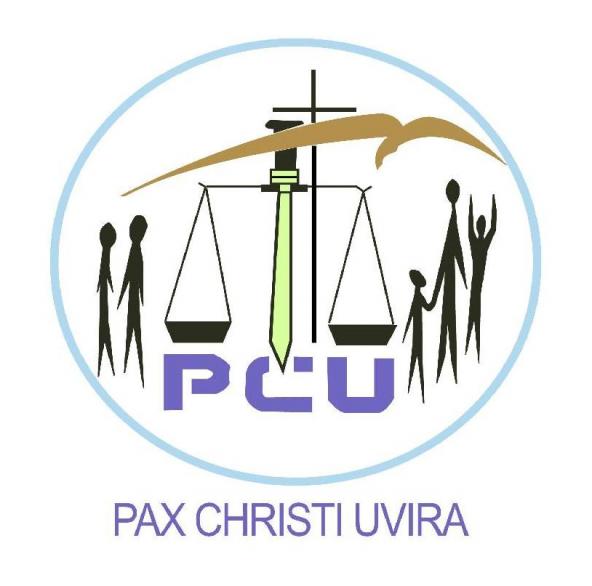
Member(s)
Pax Christi Uvira asbl
on 30 April 2020
Pax Christi Uvira is a non-profit association (asbl) created in 2003 in Uvira (Diocese of Uvira) in the province of South Kivu, in the east of the Democratic Republic of Congo. It joins the World Catholic Movement for Peace, PAX CHRISTI INTERNATIONAL, as a local group. It is an NGO under Congolese law (with legal […]
2020
Democratic Republic of the Congo
Document(s)
Note verbale dated 11 January 2008 from the Permanent Missions to the United Nations of Afghanistan, Antigua and Barbuda, […] and Zimbabwe addressed to the Secretary-General
By United Nations, on 8 September 2020
2020
United Nations report
Afghanistan
Antigua and Barbuda
Bahamas
Bahrain
Bangladesh
Barbados
Botswana
Brunei Darussalam
Central African Republic
China
Comoros
Democratic People's Republic of Korea
Dominica
Egypt
Equatorial Guinea
Eritrea
Eswatini
Ethiopia
Fiji
Grenada
Guinea
Guyana
Indonesia
Iran (Islamic Republic of)
Iraq
Jamaica
Japan
Jordan
Kuwait
Lao People's Democratic Republic
Libya
Malaysia
Maldives
Mauritania
Mongolia
Moratorium
Myanmar
Nigeria
Oman
Pakistan
Papua New Guinea
Qatar
Saint Kitts and Nevis
Saint Lucia
Saint Vincent and the Grenadines
Saudi Arabia
Singapore
Solomon Islands
Somalia
Sudan
Suriname
Syrian Arab Republic
Thailand
Tonga
Trinidad and Tobago
Uganda
United Arab Emirates
Yemen
Zimbabwe
aresfrruzh-hantMore details See the document
The Permanent Missions to the United Nations in New York listed below present their compliments to the Secretary-General of the United Nations and have the honour to refer to resolution 62/149, entitled “Moratorium on the use of the death penalty”, which was adopted by the Third Committee on 15 November 2007, and subsequently by the General Assembly on 18 December 2007 by a recorded vote. The Permanent Missions wish to place on record that they are in persistent objection to any attempt to impose a moratorium on the use of the death penalty or its abolition in contravention to existing stipulations under international law, for the following reasons:
- Document type United Nations report
- Countries list Afghanistan / Antigua and Barbuda / Bahamas / Bahrain / Bangladesh / Barbados / Botswana / Brunei Darussalam / Central African Republic / China / Comoros / Democratic People's Republic of Korea / Dominica / Egypt / Equatorial Guinea / Eritrea / Eswatini / Ethiopia / Fiji / Grenada / Guinea / Guyana / Indonesia / Iran (Islamic Republic of) / Iraq / Jamaica / Japan / Jordan / Kuwait / Lao People's Democratic Republic / Libya / Malaysia / Maldives / Mauritania / Mongolia / Myanmar / Nigeria / Oman / Pakistan / Papua New Guinea / Qatar / Saint Kitts and Nevis / Saint Lucia / Saint Vincent and the Grenadines / Saudi Arabia / Singapore / Solomon Islands / Somalia / Sudan / Suriname / Syrian Arab Republic / Thailand / Tonga / Trinidad and Tobago / Uganda / United Arab Emirates / Yemen / Zimbabwe
- Themes list Moratorium
- Available languages مؤرخــةشــفويةمــذكرة11الثــانيكــانون/ينــاير2008Nota verbal de fecha 11 de enero de 2008 dirigida al Secretario General por las Misiones Permanentes ante las Naciones Unidas del Afganistán, Antigua y Barbuda, [...] y Zimbabwe ante las Naciones UnidasNote verbale datée du 11 janvier 2008, adressée au Secrétaire général par les missions permanentes auprès de l’Organisation des Nations Unies de l’Afghanistan, d’Antigua-et-Barbuda, [...] et du ZimbabweВербальная нота Постоянных представительств Антигуа и Барбуды, Афганистана, […] и Японии при Организации Объединенных Наций от 11 января 2008 года на имя Генерального секретаря普通照会2007

Member(s)
Serbia Against Capital Punishment (SACP)
on 30 April 2020
Serbia Against Capital Punishment (SACP) was formed in 2012 to work towards universal abolition of the death penalty and to oppose its reintroduction in Serbia or any other country. It also opposes torture, as well as all other inhuman and degrading punishments. SACP maintains a data base of more than 7.000 persons sentenced to death […]
2020
Serbia

Member(s)
Witness to Innocence
on 30 April 2020
The mission of Witness to Innocence (WTI) is to unite U.S. exonerated death row survivors and their loved ones to become a powerful force for social justice and transformation. WTI seeks to abolish the death penalty, to reform the U.S. criminal justice system to prevent wrongful convictions, and to secure fair financial compensation and social […]
United States

Member(s)
Grupo de Apoyo Mutuo (GAM)
on 30 April 2020
Mandate and goals: Organization of relatives of missing persons illegally detained which works for justice, investigating past cases, opening legal proceedings against the national system and the human rights system. Kind of actions: We work for justice, for the strengthening of the institutions linked to the criminal investigation and against the death penalty. Actions aiming […]
Guatemala

Member(s)
European Saudi Organization for Human Rights (ESOHR)
on 29 November 2023
Founded in 2013 in response to extensive human rights abuses in Saudi Arabia, European Saudi Organization for Human Rights (ESOHR), which is based in Berlin, emerged in the face of a robust campaign aimed at suppressing civil society and curtailing the activities of human rights advocates. ESOHR is committed to the abolition of the death […]
2023
Saudi Arabia
Article(s)
5th World Day against the death penalty: the world decides!
By Thomas Hubert, on 29 June 2007
On October 10th, 2007, the World Day against the Death Penalty focussed on the proposed UN General Assembly resolution for a universal moratorium on executions. The proposal would save lives and give the population of retentionist states an opportunity to see for themselves that a pause in death sentences does not lead to higher crime rates.
2007
Moratorium
Document(s)
The Death Penalty for Drug Crimes in Asia
By World Coalition Against the Death Penalty / Fédération Internationale des Ligues des Droits de l'Homme (FIDH), on 1 January 2015
2015
NGO report
More details See the document
The report, published for the 13th World Day against the Death Penalty, analyzes how the death penalty is applied for drug-related crimes in Asia, evaluates the most common arguments used by governments to justify their use of this inhumane and illegal measure, and exposes why these arguments are unjustified. Asia is the continent that executes the most people for drug-related crimes. However, the death penalty has not proven to be effective in reducing drug crimes in Asia.
- Document type NGO report
- Themes list Drug Offences, Country/Regional profiles,
Document(s)
Leaflet World Day 2011 on the inhumanity of the death penalty
By World Coalition Against the Death Penalty, on 1 January 2011
2011
Campaigning
frMore details Download [ pdf - 242 Ko ]
This information leaflet about the 2011 World Day on the inhumanity of the death penalty gives background information, 10 arguments to end the death penalty and 10 things you can do to abolish the death penalty.
- Document type Campaigning
- Themes list Networks,
- Available languages Brochure Journée mondiale 2011 : "La peine de mort est inhumaine"
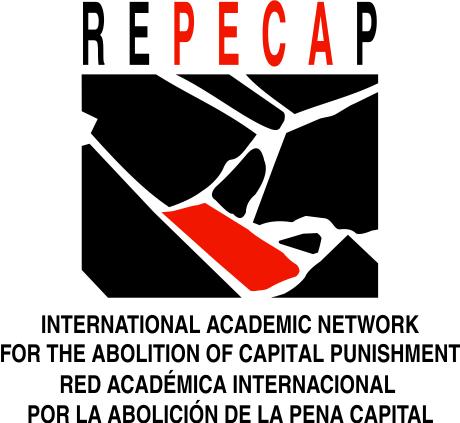
Member(s)
International Academic Network for the Abolition of Capital Punishment (REPECAP)
on 30 April 2020
REPECAP was founded in 2009 with the aim of supporting preparations for the creation of the International Commission against the Death Penalty that was created a year later. We represent a non-governmental organization whose purpose is of academic nature for the dissemination of scientific knowledge impartially through its many nodes present at prestigious Universities around […]
2020
Spain
Document(s)
The Death Penalty in 2020: Year-End Report
By Death Penalty Information Center, on 1 January 2020
2020
NGO report
United States
More details See the document
2020 was abnormal in almost every way, and that was clearly the case when it came to capital punishment in the United States. The interplay of four forces shaped the U.S. death penalty landscape in 2020: the nation’s long-term trend away from capital punishment; the worst global pandemic in more than a century; nationwide protests for racial justice; and the historically aberrant conduct of the federal administration. At the end of the year, more states had abolished the death penalty or gone ten years without an execution, more counties had elected reform prosecutors who pledged never to seek the death penalty or to use it more sparingly; fewer new death sentences were imposed than in any prior year since the Supreme Court struck down U.S. death penalty laws in 1972; and despite a six-month spree of federal executions without parallel in the 20th or 21st centuries, fewer executions were carried out than in any year in nearly three decades.
- Document type NGO report
- Countries list United States
Document(s)
2014 Report – Moratorium on the use of the death penalty
By United Nations, on 8 September 2020
2020
NGO report
arrufrzh-hantesMore details See the document
The present report is submitted to the General Assembly pursuant to its resolution 67/176. It discusses trends towardsthe abolition of the death penalty andthe establishment of moratoriums on executions. The report also reflects on the application of international standards relating to the protection of the rights of those facing the death penalty and discusses various international and regional initiativesfor the implementation of resolution67/176.
- Document type NGO report
- Themes list International law, Moratorium , Trend Towards Abolition,
- Available languages تقرير 2014 - وقف العمل بعقوبة الإعدامДоклад 2014 - Мораторий на при менение смертной казниRapport 2014 - Moratoire sur l’application de la peine de mort2014报告 - 暂停使用死刑Informe 2014 - Moratoria del uso de la pena de muerte
Document(s)
Protocol No. 13 to the Convention for the Protection of Human Rights and Fundamental Freedoms, concerning the abolition of the death penalty in all circumstances
By Council of Europe, on 1 January 2002
2002
Regional body report
enenrufrMore details See the document
Article 1 – Abolition of the death penaltyThe death penalty shall be abolished. No one shall be condemned to such penalty or executed.
- Document type Regional body report
- Themes list International law,
- Available languages German : Protokoll Nr. 13 zur Konvention zum Schutze der Menschenrechte und Grundfreiheiten bezüglich der Abschaffung der Todesstrafe unter allen UmständenItalian : Protocollo n° 13 alla Convenzione per la salvaguardia dei Diritti dell'Uomo e delle Libertà fondamentali relativo all'abolizione delle pena di morte in ogni circostanzaПротокол № 13 к Конвенции о защите прав человека и основных свобод относительно отмены смертной казни при любых обстоятельствахProtocole n° 13 à la Convention de sauvegarde des Droits de l'Homme et des Libertés fondamentales, relatif à l'abolition de la peine de mort en toutes circonstances
Document(s)
Protocol No. 6 to the Convention for the Protection of Human Rights and Fundamental Freedoms concerning the Abolition of the Death Penalty
By Council of Europe, on 1 January 1983
1983
Regional body report
enenrufrMore details See the document
Article 1 – Abolition of the death penaltyThe death penalty shall be abolished. No-one shall be condemned to such penalty or executed.
- Document type Regional body report
- Themes list International law,
- Available languages German : Protokoll Nr. 6 zur Konvention zum Schutze der Menschenrechte und Grundfreiheiten über die Abschaffung der TodesstrafeItalian : Protocollo n° 6 alla Convenzione per la salvaguardia dei Diritti dell'Uomo e delle Libertà fondamentali sull'abolizione delle pena di morteПротокол № 6 к Конвенции о защите прав человека и основных свобод относительно отмены смертной казниProtocole no. 6 à la Convention de sauvegarde des Droits de l'Homme et des Libertés fondamentales concernant l'abolition de la peine de mort
Document(s)
Human Rights Council, 39th session – Question of the death penalty
By United Nations, on 8 September 2020
2020
NGO report
More details See the document
Pursuant to Human Rights Council decision 18/117, the present report is submitted to update previous reports on the question of the death penalty. In his report the Secretary-General confirms that the trend towards the universal abolition of the death penalty is continuing. During the reporting period, initiatives limiting the use of the death penalty and implementing the safeguards guaranteeing protection of the rights of those facing the death penalty were also recorded in several States. A minority of States continued to use the death penalty, in contravention of international human rights law. As requested by the Council in its resolution 22/11, the report also includes information on the human rights of children of parents sentenced to the death penalty or executed.
- Document type NGO report
- Themes list Juveniles, Death Penalty,
Document(s)
Status of signature and ratification of the Second Optional Protocol to the International Covenant on Civil and Political Rights, aiming at the abolition of the death penalty.
By United Nations, on 1 January 1989
1989
NGO report
frfrMore details See the document
Status of signature ratification of the Second Optional Protocol to the International Covenant on Civil and Political Rights, aiming at the abolition of the death penalty, including declarations, reservations and objections.
- Document type NGO report
- Themes list Moratorium ,
- Available languages État de signature et ratification du Deuxième Protocole facultatif se rapportant au Pacte international relatif aux droits civils et politiques visant à abolir la peine de mort.État de signature et ratification du Deuxième Protocole facultatif se rapportant au Pacte international relatif aux droits civils et politiques visant à abolir la peine de mort.

Article(s)
The World Coalition Against the Death Penalty celebrates its 20th anniversary!
on 13 May 2022
For this occasion, we wanted to give the floor to our founding member organizations. 20 years of memories, meetings, activism and fight with the hope to see one day a world without death penalty. Discover those testimonials in our newsletter.
2022
Document(s)
Turning the tide in the Caribbean: towards an end to the death penalty
By Amnesty International, on 1 January 2013
2013
Campaigning
More details See the document
This toolkit is for activists working towards the abolition of the death penalty in the English-speaking Caribbean. Drawing on many years of Amnesty International’s work to promote all human rights and to oppose violations of those rights, including the death penalty, it provides practical tips and suggestions for advocacy and campaigning. It sets out key arguments and relevant international human rights standards and provides information about resources that activists can use to strengthen and broaden the campaign against the death penalty in the English-speaking Caribbean.
- Document type Campaigning
- Themes list Public debate, Country/Regional profiles,
Document(s)
Question of the death penalty: Report of the Secretary-General
By United Nations, on 1 January 2008
2008
International law - United Nations
arrufrzh-hantesMore details See the document
The present report contains information covering the period from January 2006 to May 2008. The report indicates that the trend towards abolition of the death penalty continues; this is illustrated, inter alia, by the increase in the number of countries that are completely abolitionist and by the increase in ratifications of international instruments that provide for the abolition of this form of punishment.
- Document type International law - United Nations
- Themes list Trend Towards Abolition,
- Available languages مسألة عقوبة الإعدام: تقرير مقدم من الأمين العامВопрос о смертной казни: Доклад Генерального секретаряQuestion de la peine de mort : Rapport du Secrétaire général死刑问题: 秘书长的报告La cuestión de la pena capital: Informe del Secretario General
Document(s)
Report on the Death Penalty in Iraq UNAMI/OHCHR
By Office of the High Commissioner for Human Rights (OHCHR) / United Nations Assistance Mission for Iraq (UNAMI) Human Rights Office, on 1 January 2014
2014
International law - United Nations
More details See the document
This reporton the death penalty in Iraqis publishedjointlyby the Human RightsOffice of theUnited Nations Assistance Mission for Iraq (UNAMI)andthe Office of the United Nations HighCommissioner for Human Rights (OHCHR).The first section of this report outlines the international human rights standards on the use of thedeath penalty. The subsequent sections examine the domestic legal framework for the use of thedeath penalty in Iraq, judicial proceedings in death penalty cases, the implementation of the deathpenalty since 2004, and thejustifications put forward by the Government of Iraq for its continueduse. The report concludes with a set of recommendations tothe Iraqi authorities, the Governmentof Kurdistan Region and the international community.
- Document type International law - United Nations
- Themes list Due Process , Hanging, Country/Regional profiles,
Document(s)
Fighting Against the Death Penalty in the Arab World
By Mona Chamass / World Coalition Against the Death Penalty, on 1 January 2010
2010
NGO report
arfrMore details Download [ pdf - 1019 Ko ]
This report has three broad sections. the first sets out the state of play of this issue in the 22 countries concerned. As well as the latest political developments, it examines the various national, regional and international protagonists. Particular attention has been paid to seven countries: Algeria, Jordan, lebanon, Morocco and tunisia in view of their legal progress towards abolition; and Egypt and Yemen for the energy of their abolitionist players. The second section identifies and analyses the relevant arguments against use of the death penalty, including the religious argument. Finally, the last section discusses the outlook for the future and suggests action and recommendations to strengthen the abolitionist movement. the report’s main aim is to encourage regional and sub-regional currents.
- Document type NGO report
- Themes list Religion , World Coalition Against the Death Penalty,
- Available languages كفاح ضد العقوبة الاعدام في العالم العربيLa Lutte contre la peine de mort dans le monde arabe
Document(s)
High-level panel discussion on the question of the death penalty
By United Nations / Office of the High Commissioner for Human Rights (OHCHR) , on 1 January 2019
2019
International law - United Nations
rufrzh-hantesMore details See the document
The Report of the UN Hugh Commissioner for human Rights provides a summary of the high-level discussion on the question of the death penalty, held on 4 March 2015, at the twenty-fifth session of the Council. The aim of the panel discussion was to exchange views on the question of the death penalty, and to address regional efforts aiming at the abolition of the death penalty and the challenges faced in that regard.
- Document type International law - United Nations
- Themes list Death Penalty,
- Available languages Обсуждение вопроса о смертной казни в рамках дискуссионной группы высокого уровня. Доклад Верховного комиссара Организации Объединенных Наций по правам человекаRéunion-débat de haut niveau sur la question de la peine de mort. Rapport du Haut-Commissaire des Nations Unies aux droits de l’homme死刑问题高级别小组讨论会. 联合国人权事务高级专员的报告Mesa redonda de alto nivel sobre la cuestión de la pena de muerte. Informe del Alto Comisionado de las Naciones Unidas para los Derechos Humanos
Document(s)
Note verbale dated 16 April 2013 from the Permanent Mission of Egypt to the United Nations addressed to the Secretary-General
By United Nations, on 8 September 2020
2020
United Nations report
Afghanistan
Antigua and Barbuda
Bahrain
Bangladesh
Barbados
Botswana
Brunei Darussalam
Chad
China
Democratic People's Republic of Korea
Egypt
Equatorial Guinea
Eritrea
Eswatini
Ethiopia
Grenada
Guyana
India
Iran (Islamic Republic of)
Iraq
Jamaica
Kuwait
Lao People's Democratic Republic
Libya
Malaysia
Mauritania
Moratorium
Myanmar
Nigeria
Oman
Pakistan
Papua New Guinea
Qatar
Saint Kitts and Nevis
Saint Lucia
Saint Vincent and the Grenadines
Saudi Arabia
Singapore
Solomon Islands
Somalia
Sudan
Syrian Arab Republic
Tonga
Trinidad and Tobago
Uganda
United Arab Emirates
Yemen
Zimbabwe
aresfrruzh-hantMore details See the document
The permanent missions to the United Nations in New York listed below have the honour to refer to General Assembly resolution 67/176, entitled “Moratorium on the use of the death penalty”, which was adopted by the Third Committee on 19 November 2012, and subsequently by the General Assembly on 20 December 2012 by a recorded vote. The permanent missions wish to place on record that they are in persistent objection to any attempt to impose a moratorium on the use of the death penalty or its abolition in contravention of existing stipulations under international law, for the following reasons:
- Document type United Nations report
- Countries list Afghanistan / Antigua and Barbuda / Bahrain / Bangladesh / Barbados / Botswana / Brunei Darussalam / Chad / China / Democratic People's Republic of Korea / Egypt / Equatorial Guinea / Eritrea / Eswatini / Ethiopia / Grenada / Guyana / India / Iran (Islamic Republic of) / Iraq / Jamaica / Kuwait / Lao People's Democratic Republic / Libya / Malaysia / Mauritania / Myanmar / Nigeria / Oman / Pakistan / Papua New Guinea / Qatar / Saint Kitts and Nevis / Saint Lucia / Saint Vincent and the Grenadines / Saudi Arabia / Singapore / Solomon Islands / Somalia / Sudan / Syrian Arab Republic / Tonga / Trinidad and Tobago / Uganda / United Arab Emirates / Yemen / Zimbabwe
- Themes list Moratorium
- Available languages مذكرة شفوية مؤرخة 16 نيسان/أبريل 2013 موجهة إلى الأمين العام من البعثة الدائمة لمصر لدى الأمم المتحدةNota verbal de fecha 16 de abril de 2013 dirigida al Secretario General por la Misión Permanente de Egipto ante las Naciones UnidasNote verbale datée du 16 avril 2013, adressée au Secrétaire général par la Mission permanente de l’Égypte auprès de l’Organisation des Nations UniesВербальная нота Постоянного представительства Египта при Организации Объединенных Наций от 16 апреля 2013 года на имя Генерального секретаря2013年4月16日埃及常驻联合国代表团给秘书长的普通照会
Document(s)
Note verbale dated 7 September 2017 from the Permanent Mission of Egypt to the United Nations addressed to the Secretary-General
By United Nations, on 1 January 2017
2017
United Nations report
Antigua and Barbuda
Bangladesh
Barbados
Botswana
Brunei Darussalam
Chad
China
Democratic People's Republic of Korea
Egypt
Ethiopia
Grenada
Iran (Islamic Republic of)
Iraq
Jamaica
Kuwait
Libya
Malaysia
Maldives
Moratorium
Nigeria
Oman
Pakistan
Papua New Guinea
Saint Kitts and Nevis
Saint Lucia
Saint Vincent and the Grenadines
Saudi Arabia
Singapore
Sudan
Syrian Arab Republic
United Arab Emirates
Yemen
Zimbabwe
aresfrruzh-hantMore details See the document
The Permanent Missions to the United Nations in New York listed below have the honour to refer to General Assembly resolution 71/187, entitled “Moratorium on the use of the death penalty”, which was adopted by the Third Committee on 17November 2016 and subsequently by the Assembly on 19 December 2016 by a recorded vote. The Permanent Missions wish to place on record that they are in persistent objection to any attemptto impose a moratorium on the use of the death penalty or its abolition in contravention of existing stipulations under international law, for the following reasons:
- Document type United Nations report
- Countries list Antigua and Barbuda / Bangladesh / Barbados / Botswana / Brunei Darussalam / Chad / China / Democratic People's Republic of Korea / Egypt / Ethiopia / Grenada / Iran (Islamic Republic of) / Iraq / Jamaica / Kuwait / Libya / Malaysia / Maldives / Nigeria / Oman / Pakistan / Papua New Guinea / Saint Kitts and Nevis / Saint Lucia / Saint Vincent and the Grenadines / Saudi Arabia / Singapore / Sudan / Syrian Arab Republic / United Arab Emirates / Yemen / Zimbabwe
- Themes list Moratorium
- Available languages مذكرة شفوية مؤرخة 7 أيلول/سبتمبر 2017 موجهة إلى الأمين العام من البعثة الدائمة لمصر لدى الأمم المتحدةNota verbal de fecha 7 de septiembre de 2017 dirigida al Secretario General por la Misión Permanente de Egipto ante las Naciones Unidas.Note verbale datée du 7 septembre 2017, adressée au Secrétaire général par la Mission permanente de l’Égypte auprès de l’Organisation des Nations UniesВербальная нота Постоянного представительства Египта при Организации Объединенных Наций от 7 сентября 2017 года на имя Генерального секретаря2017 年 9 月 7 日埃及常驻联合国代表团给秘书长的普通照会
Member(s)
Children Education Society (CHESO)
on 30 April 2020
The mandate of Children Education Society (CHESO) is: – To combat causes of most vulnerable children including children’s rights violations, poor governance, HIV/AIDS, poverty, climate change and reinforce realization of the children’s right to education -To eliminate bad policies and laws subjecting children to vulnerability – To end human rights violations subjecting children to vulnerability […]
2020
United Republic of Tanzania
Page(s)
Legal information
on 20 November 2020
Credits This website is published by the World Coalition Against the Death Penalty. Director: Aurélie PlaçaisProgram Manager: Bronwyn DudleyAdministrative and Financial Manager: Wilfred GondoroLogisitics and Partnership Manager: Carlos ValeraWeb-Editor: Hédia Zaalouni Development and production: Moduloo (J Villalard)Graphic design: Les poulets bicyclettes Hosting : OVH Copyright informationThe contents of this website is licensed under a Creative Commons license which gives […]
2020
Document(s)
The Death Penalty in the OSCE Area: Background Paper 2019
By Organization for Security and Co-operation in Europe (OSCE), on 1 January 2019
2019
International law - Regional body
More details See the document
Fifty-five (55) OSCE participating States have either completely abolished the death penalty or maintain moratoria on executions as an important first step towards abolition. However, in a global context where discussions focus on the threat of terrorism and a need to be tough on crime, it is perhaps not surprising that the question of reintroducing the death penalty surfaces at times, including in the OSCE region. It is, therefore, a good moment to reflect on the reasons why there is still support for the death penalty, considering the growing understanding that capital punishment is a cruel, inhuman and degrading punishment. Some of the most persistent arguments used to justify the use of the death penalty and its possible reintroduction will be discussed in the report.
- Document type International law - Regional body
- Themes list Trend Towards Abolition,
Document(s)
Question of the death penalty : report of the Secretary-General submitted pursuant to Commission resolution 2003/67
By United Nations, on 1 January 2004
2004
International law - United Nations
arrufrzh-hantesMore details See the document
The present report contains information covering the period from January 2003 through December 2003. The report indicates that the trend towards abolition of the death penalty continues, illustrated, inter alia, by the increase in the number of ratifications of international instruments that provide for the abolition of this punishment.
- Document type International law - United Nations
- Themes list Trend Towards Abolition,
- Available languages الموضوع العقوبة الاعدام : تقرير الأمين العام مقدم بشأن قرار اللجنة 2003/67По вопросу смертной казни: доклад Генерального Секретаря, предоставленный в ответ на резолюцию 2003/67 Комиссии по правам человекаQuestion de la peine de mort: Rapport du Secrétaire général présenté en application de la résolution 2003/67死刑问题: 秘书长按照委员会第2003/67 号决议提交的报告Cuestión de la pena capital: Informe del Secretario General presentado de conformidad con la resolución 2003/67
Document(s)
The Death Penalty in 2017: Year End Report
By Death Penalty Information Center, on 1 January 2017
2017
NGO report
More details See the document
tences remained near historically low levels in 2017, as public support for the death penalty fell to its lowest level in 45 years, according to a report released today by the Death Penalty Information Center (DPIC). Eight states carried out 23 executions, half the number of seven years ago, and the second lowest total since 1991. Only the 20 executions in 2016 were lower. Fourteen states and the federal government are projected to impose 39 new death sentences in 2017, the second lowest annual total since the U.S. Supreme Court declared the death penalty unconstitutional in 1972. It was the seventh year in a row that fewer than 100 death sentences were imposed nationwide.
- Document type NGO report
- Themes list Capital offences, Cruel, Inhuman and Degrading Treatment and Punishment, Arbitrariness, Death Row Conditions, Death Penalty, Country/Regional profiles,
Document(s)
Note verbale dated 13 September 2019 from the Permanent Representative of Egypt to the United Nations addressed to the Secretary-General
By United Nations, on 15 October 2020
2020
United Nations report
Bahrain
Bangladesh
Botswana
Brunei Darussalam
Chad
China
Democratic People's Republic of Korea
Egypt
Ethiopia
Grenada
Iran (Islamic Republic of)
Iraq
Jamaica
Kuwait
Libya
Moratorium
Nigeria
Oman
Pakistan
Papua New Guinea
Qatar
Saint Kitts and Nevis
Saint Lucia
Saint Vincent and the Grenadines
Saudi Arabia
Singapore
Sudan
Syrian Arab Republic
United Arab Emirates
Yemen
Zimbabwe
aresfrruzh-hantMore details See the document
The Permanent Missions to the United Nations inNew York listed below have the honour to refer to General Assembly resolution 73/175, entitled “Moratorium on the use of the death penalty”, which was adopted by the Assembly on 17 December 2018 by a recorded vote. The Permanent Missions wish to place on record that they are in persistent objection to any attempt to impose a moratorium on the use of the death penalty or its abolition in contravention of existing stipulations under international law, for the following reasons:
- Document type United Nations report
- Countries list Bahrain / Bangladesh / Botswana / Brunei Darussalam / Chad / China / Democratic People's Republic of Korea / Egypt / Ethiopia / Grenada / Iran (Islamic Republic of) / Iraq / Jamaica / Kuwait / Libya / Nigeria / Oman / Pakistan / Papua New Guinea / Qatar / Saint Kitts and Nevis / Saint Lucia / Saint Vincent and the Grenadines / Saudi Arabia / Singapore / Sudan / Syrian Arab Republic / United Arab Emirates / Yemen / Zimbabwe
- Themes list Moratorium
- Available languages مذكرة شفوية مؤرخة 13 أيلول/سبتمبر 2019 موجهة إلى الأمين العام من الممثل الدائم لمصر لدى الأمم المتحدةNota verbal de fecha 13 de septiembre de 2019 dirigida al Secretario Generalpor el Representante Permanente de Egipto ante las Naciones UnidasNote verbale datée du 13 septembre 2019, adressée au Secrétaire général par le Représentant permanent de l’Égypte auprès de l’Organisation des Nations UniesВербальная нота Постоянного представителя Египта при Организации Объединенных Наций от 13 сентября 2019 года на имя Генерального секретаря2019年9月13日埃及常驻联合国代表给秘书长的普通照会
Page(s)
Library
on 22 June 2020
The online library contains over 2,000 resources on the death penalty identified by the World Coalition since the beginning of the 21st century, in over 15 languages. Except for documents published by the World Coalition, the library links to external resources, which do not necessarily reflect the views of the World Coalition. To report a […]
2020

Article(s)
China: Judicial guidelines to curtail activism for Taiwan a further blow for human rights protections
By Amnesty International, Anti-Death Penalty Asia Network, Capital Punishment Justice Project, the Rights Practice and the World Coalition Against the Death Penalty, on 1 August 2024
Taken from the declaration posted on Amnesty International’s web page found here. “Amnesty International and four other organizations are alarmed by the recent publication by the Chinese authorities of new judicial guidelines providing directives to prosecute and harshly punish, including by the death penalty, those advocating and acting for Taiwan’s independence. The guidance effectively encourages […]
2024
China
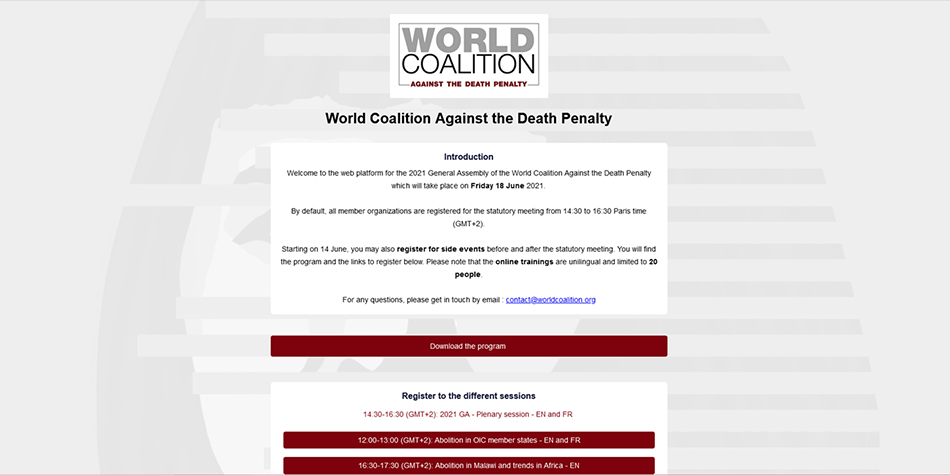
Article(s)
Program of the 18 June 2021 General Assembly
By World Coalition Against the Death Penalty, on 15 June 2021
If you are a member organization, join the fantastic program we will have on Friday 18 June!
2021
Juveniles
Women
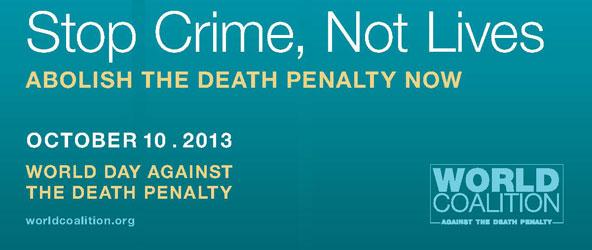
Article(s)
Calendar of events for World Day
By WCADP, on 10 September 2013
On 10 October 2013, the World Day Against the Death Penalty is focusing on the death penalty in the Greater Caribbean. Browse the schedule and the map to prepare and promote the events planned around the world on the big day.
2013
Cruel, Inhuman and Degrading Treatment and Punishment

